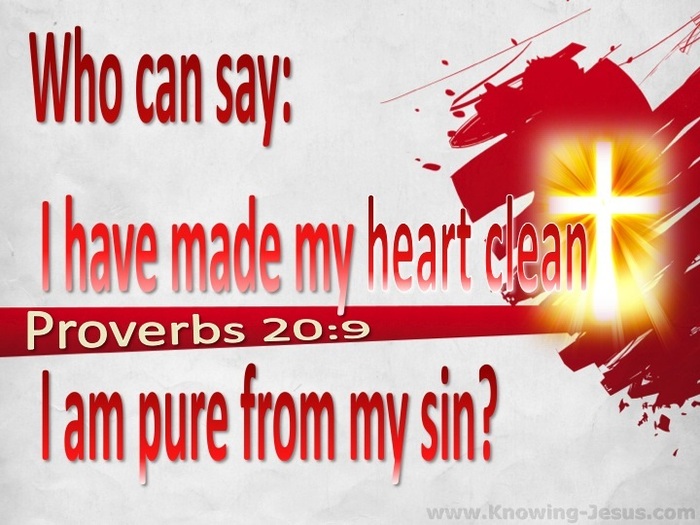
I love these rhetorical questions
That we try to shift each day
And somehow continue to behave
In our self-righteous way.
Here is an interesting question
Asked by the wisest of men
That when the rest of it is added
Shows how we pretend.
Indeed, that is what we do
In our day to day lives
And when we promote our purity
It is nothing but lies.
“I have made myself clean,”
That is an absolute win
And even greater still would be,
“I am pure from my sin.”
But it is part of a question
Beginning with “who can say…”
And it’s a rhetorical question
Which answers no one, no way.

And notice its specificity:
It doesn’t say “free from sin”
For in that general regard
It is through Christ that we win.
But the pronoun “my”
Speaks of sins that we commit
That in our daily living
May be a cover-up habit.
Who can say?
And the answer comes back:
No one, no way
And that is an unalterable fact.
None can make himself clean
Or pure from his sin
And if anyone thinks he can
His sight is less than dim.
Solomon came upon this
And he was the wisest ever
So, none of us can;
We are not nearly as clever.
In Ecclesiastes he reminds us
There’s none righteous on earth
That has continually done good
Since the time of his birth.
In Romans 6 and verse 23:
All have sinned and fallen short
Of God’s glory, that is,
We are all of that sort.
So that if we say we have no sin
That is a huge lie
Such that if God were human
He would do nothing but sigh.
Like a loving parent
That can’t stop a child from lying
But can only sigh at the futility
After several years of trying.
No use comparing ourselves
With those we consider beneath,
The Pharisees’ self-righteousness
Caused Christ much grief.
We fall short in our actions
We fall short in our minds
And the expressions from our hearts
Are often off line.
The heart and the mind
The emotions and the conscience,
All are stained with sin
And require constant repentance.

None can say…
I have made my heart clean,
I am pure from my sin:
None! Not one!
Stewart Russell © September 1, 2020
No comments:
Post a Comment